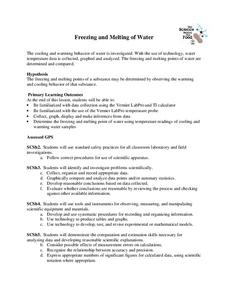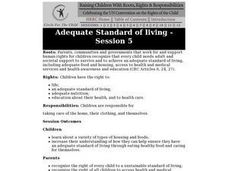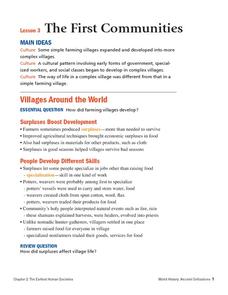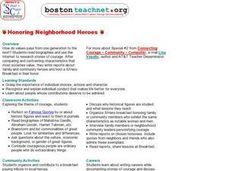Curated OER
A TRIP TO THE CAFETERIA
Students take a "behind-the-scenes" look at the school cafeteria as food is being prepared. They take notes on the jobs (i.e., division of labor) that they observe in the cafeteria. They write about the division of labor in the school...
Curated OER
Barn Owl
In this barn owl worksheet, students read four paragraphs of information about barn owls, and study a photograph. There are no questions here.
Curated OER
Gotta-Have Gear Scramble
In this activity worksheet, learners unscramble words of items hikers should always pack for a hiking trip. After unscrambling the words, students draw a line matching each word to its definition. Learners also calculate how much food...
Curated OER
Hurricane Katrina Relief
Students research philanthropic organizations that helped after Hurricane Katrina. They organize a collection drive to contribute to the nonprofit organization. They reflect on their efforts.
Curated OER
Unearthing The Facts
Students use agriculture related questions in order to build research skills. The questions are given and then they are expected to determine the best resource for finding the answers. The connection to the farmer is how they use...
Curated OER
Shark Attack
Students examine the white shark. They think critically about a set of shark facts and predict whether the statements are true or false. Students describe a year in the life of a white shark living in the Red Triangle. They create a...
Curated OER
What is Money? Learn the Role of Money in a Free Market System
Students view a seashell and listen as the teacher explains that these were sometimes used as money. They listen as the teacher lectures on medium of exchange, barter, and commodity. Students determine the number of chickens it would...
University of Georgia
Splat!
What does viscosity have to do with splatter? An activity shows that the viscosity of a substance is inversely proportional to the distance of its splatter. Learners conduct the experiment by collecting data, graphing, and analyzing...
University of Georgia
Flavor of Organic Chemistry
Introduce organic chemistry through an analysis of flavor. A three-part unit begins with an overview of the components of flavor. Next, scholars prepare esters through esterification. Finally, they examine how all senses have an impact...
University of Georgia
Freezing and Melting of Water
Examine the behavior of energy as water freezes and melts. An engaging activity provides a hands-on experience to learners. Collaborative groups collect data and analyze the graphs of the temperature of water as it freezes and then...
University of Georgia
Bag O' Isotopes
Accommodate your chemistry class with an experiment that is both entertaining and educational. Through the activity, blossoming chemists perform calculations on various isotopes, as represented by beans and legumes, to obtain...
University of Georgia
Stoichiometry of S'mores
How fun would it be to teach the concept of stoichiometry while allowing your chemistry class to assemble a classic campfire treat? This fun and engaging activity allows pupils to explore the principles of the chemical theory while...
University of Georgia
Using Freezing-Point Depression to Find Molecular Weight
Explore the mathematical relationship between a solvent and solute. Learners use technology to measure the cooling patterns of a solvent with varying concentrations of solute. Through an analysis of the data, pupils realize that the...
University of Georgia
Heating and Cooling of Land Forms
Compare heating and cooling rates of different land forms. A lab activity has groups collect data on the rate of heating and cooling of soil, grass, saltwater, fresh water, and sand. An analysis of the rates shows how the different land...
Curated OER
Adequate Standard of Living: Children's Rights
Pupils and parents participate in a variety of activities designed to explore the issue of every person's right to adequate housing. They make butter, make models of different types of housing, read books, discuss the rights and...
Curated OER
Homelessness:Key Terms
Learners explore the concept of homelessness. In this social issues activity, students research homelessness through key terms, in order explore the concept in more depth.
Curated OER
What Do People Need?
Second graders discuss the difference between needs and wants and create a T chart. They brainstorm as many ways as possible to meet their basic needs. They analyze different ways the community gets involved to help individuals with...
Curated OER
Jingle Bell Jog
Young scholars make the connection of doing something positive for people in need by offering this student activity that reaches out to the entire surrounding community by getting sponsors for a "jog/walk-a-thon".
Houghton Mifflin Harcourt
The First Communities
These documents list essential questions and foundational concepts associated with early civilizations and farming communities in the agricultural revolution. Use this as a starting point for developing specific lessons and activities...
Curated OER
Honoring Neighborhood Heroes
Read biographies and use the internet to research stories of courage.Young writers compare and contrast characteristics that societies value. They write reports about their family and community's heroes.
Curated OER
The Achievements of the Sumerian Empire
Sixth graders identify four achievements of the Sumerians. They explain the importance of the inventions. They write about a Sumerian invention.
Curated OER
Medicare Reform
Students calculate how much of each paycheck is deducted into the Medicare system, explain the need for health insurance and Medicare, and work in small groups to develop their own plan to reform Medicare.
Curated OER
Health: Overweight Youth
Investigate the primary causes for the increase in overweight youth and discover its impact on the health care system. After watching segments from the Bill Moyers Now program, your students develop campaigns to implement in school that...
Curated OER
Habitat Basics
First graders get out and explore two different habitats to examine how each one meets the needs of the plants and animals that dwell there. They discuss what they've learned about animal habitats as they explore the outdoor environment....























